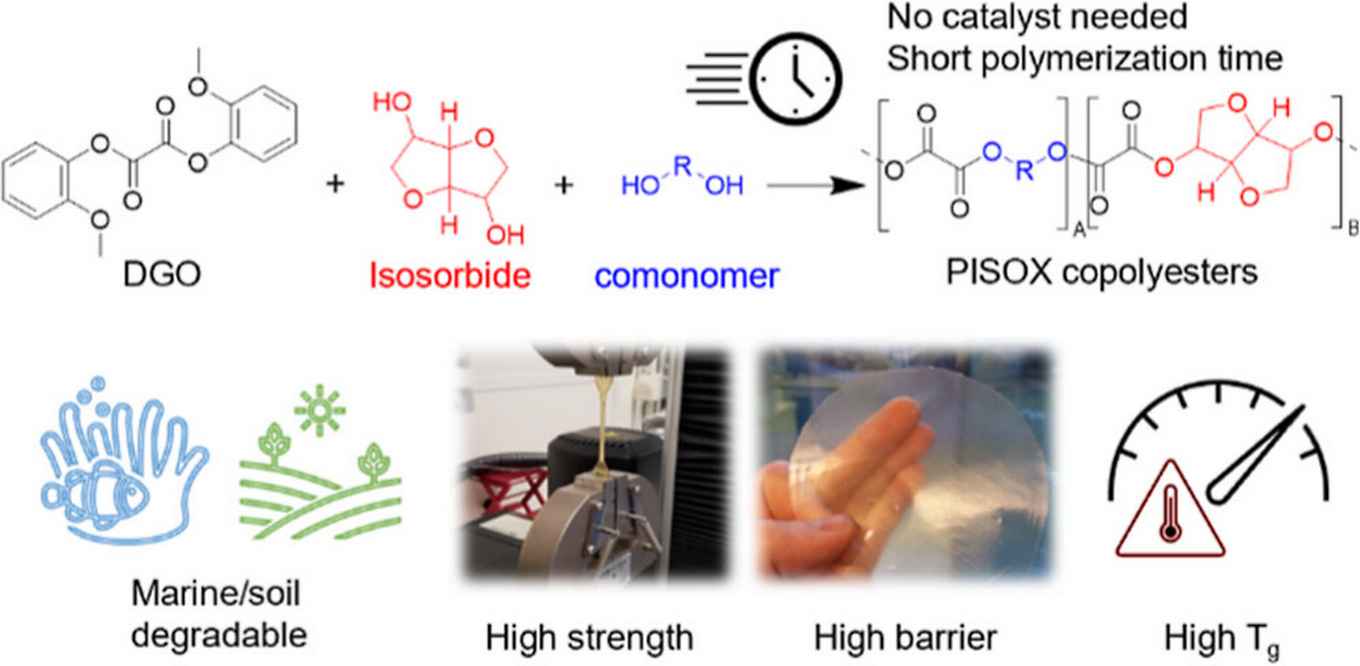Exciting applications for marine degradable, bio- and CO2-based PISOX polymers
26 June 2024

PISOX polymers are truly unique in their combination of properties. They display high-performance characteristics, both thermally and mechanically, but even so decompose relatively easily to CO2 and biomass. For instance under home-composting conditions in soil, PISOX degrades in just a few months. Under aqueous conditions it hydrolyzes in less than a year at 20 °C, without the need for enzymes.
Lead author of the paper in ACS Sustainable Chemistry and Engineering is PhD student Kevin van der Maas who will defend his thesis later this year. It also features contributions by former PhD students Dr Yue Wang and Dr Daniel H. Weinland. The research was carried out in cooperation with LEGO and chemical technology development company Avantium, of which UvA ISC group leader Prof. Gert-Jan Gruter is the Chief Technology Officer.
The paper describes the polymer synthesis from diaryl oxalates and isosorbide, that can both be obtained from renewable sources. It compares the PISOX properties to those of popular polymers such as PET and ABS. It also discusses how the combination of PISOX properties – including high barrier properties - can be utilized. Among the potential applications are compostable plastic bags and mulch films for gardening and agriculture, and packaging plastics with diminished environmental impact.
As a follow-up to the research presented in the paper, current research explores the possibility of using PISOX in temporary ‘artificial reefs’, for instance to provide support to mussel banks and plants. After growth these structures can “dissolve” in the seawater. Another explorative project concerns the use of PISOX for 3D printed personalized coffins to be used in resomation (alkaline hydrolysis).
Abstract of the paper
Oxalate esters and isosorbide serve as intriguing polymer building blocks, as they can be sourced from renewable resources, such as CO2 and glucose, respectively and the resulting polyesters offer outstanding material properties. However, the low reactivity of the secondary hydroxyl groups makes it difficult to generate high-molecular-weight polymers from isosorbide. Combining diaryl oxalates with isosorbide appears to be a promising approach to produce high-molecular-weight isosorbide-based polyoxalates (PISOX). This strategy seems to be scalable, has a short polymerization time (<5 h), and uniquely, there is no need for a catalyst. The phenols that are liberated will be recycled. PISOX demonstrates outstanding thermal, mechanical, and barrier properties; its barrier to oxygen is 35 times better than PLA, it possesses mechanical properties comparable to high-performance thermoplastics such as ABS, and the very high glass transition temperature of 167 °C can be modified by comonomer incorporation. What makes this high-performance material truly exceptional is that it decomposes to CO2 (>90%) and biomass (fungi and bacteria growth; <10%) in just a few months in soil under home-composting conditions (ambient temperature) and it hydrolyzes without enzymes present in less than a year in 20 °C water. This unique combination of properties has the potential to be utilized in a range of applications, such as biomedical uses, compostable plastic bags for gardening and agriculture, and packaging plastics with diminished environmental impact and temporary ‘artificial reefs’ to provide support to mussel banks and plants.
Paper details
Kevin van der Maas, Yue Wang, Daniel H. Weinland, Robert-Jan van Putten, Bing Wang, and Gert-Jan M. Gruter: PISOX Copolyesters─Bio- and CO2-Based Marine-Degradable High-Performance Polyesters. ACS Sustainable Chem. Eng. 2024, Publication Date June 18, 2024. DOI: 10.1021/acssuschemeng.4c02266